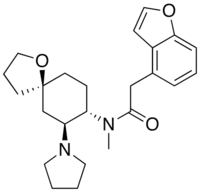Enadoline
 | |
| Clinical data | |
|---|---|
| ATC code | none |
| Identifiers | |
| |
| CAS Number |
124378-77-4 |
| PubChem (CID) | 60768 |
| IUPHAR/BPS | 1646 |
| ChemSpider |
54765 |
| UNII |
KJL283326C |
| ChEMBL |
CHEMBL318859 |
| Chemical and physical data | |
| Formula | C24H32N2O3 |
| Molar mass | 396.52 g/mol |
| 3D model (Jmol) | Interactive image |
| |
| |
| (verify) | |
Enadoline is a drug which acts as a highly selective κ-opioid agonist.
In human studies, it produced visual distortions and feelings of dissociation, reminiscent of the effects of salvinorin A.[1]
It was studied as a potential analgesic, but abandoned because of the dose-limiting effects of dysphoria, which could be expected from a κ-opioid agonist. There was mention of its potential in treating comatose head injury or stroke victims, where that type of side effect would be immaterial.[2]
Potency
When enadoline was first reported in 1990, it was "the most potent κ-selective analgesic ever reported ... 25 times more potent than morphine and 17 times more potent than U-62066".[3]
See also
References
- ↑ Walsh SL, Strain EC, Abreu ME, Bigelow GE (2001). "Enadoline, a selective kappa opioid agonist: comparison with butorphanol and hydromorphone in humans". Psychopharmacology (Berl.). 157 (2): 151–62. doi:10.1007/s002130100788. PMID 11594439.
- ↑ Barber A, Gottschlich R (1997). "Novel developments with selective, non-peptidic kappa-opioid receptor agonists". Expert Opin Investig Drugs. 6 (10): 1351–68. doi:10.1517/13543784.6.10.1351. PMID 15989506.
- ↑ Halfpenny, Paul R.; Horwell, David C.; Hughes, John; Hunter, John C.; Rees, David C. (1990). "Highly selective .kappa.-opioid analgesics. 3. Synthesis and structure-activity relationships of novel N-[2-(1-pyrrolidinyl)-4- or -5-substituted cyclohexyl]arylacetamide derivatives". Journal of Medicinal Chemistry. 33 (1): 286–91. doi:10.1021/jm00163a047. PMID 2153208.
| MOR |
|
|---|---|
| DOR |
|
| KOR |
|
| NOP |
|
| Unsorted |
|
| Others |
|
See also: Peptide receptor modulators | |
This article is issued from Wikipedia - version of the 5/30/2016. The text is available under the Creative Commons Attribution/Share Alike but additional terms may apply for the media files.